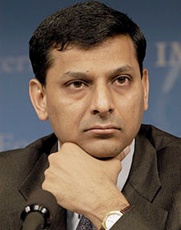RBI's Rajan slams IMF for backing manipulative monetary policies
19 Oct 2015
Reserve Bank of India governor Raghuram Rajan today called for stronger global financial institutions by imparting clear policy directions to the International Monetary Fund (IMF) and its sister institutions, so as to enable them to play an active role in development economics.
 Rajan, a former chief economist of the IMF, said developed countries continue to practice self-serving monetary policies without considering their negative impact on the global economy.
Rajan, a former chief economist of the IMF, said developed countries continue to practice self-serving monetary policies without considering their negative impact on the global economy.
IMF, he said, instead of discouraging such policies that harm global economy, tends to encourage advanced economies to pursue expansionist monetary policies at the cost of emerging economies and other lesser economies that are capital-dependent on developed economies.
IMF, he said, should stop "sitting on the sidelines" and instead play an active role in questioning the manipulative monetary policies followed by developed economies.
"Extreme" measures had steered volatile capital flows to emerging markets, while exchange rate intervention risked spurring competitive devaluations, he said in a speech at an event during the 2015 IMF/World Bank Annual Meetings in Lima, Peru.
"The IMF has been sitting on the sidelines and applauding these kinds of policies right from when they have been initiated, ?and hasn't really questioned the value of these kinds of policies," he told a G20 consultation meeting.
"We can do better," he said, calling on emerging markets to push back against such policies.
Speaking at the `Financial Inclusion: Can It Meet Multiple Macroeconomic Goals?' event during the 2015 IMF / World Bank Annual Meetings in Lima, on 8 October 2015, Rajan didn't single out any single country for criticism, but he has emerged as a leading critic of easy money policies.
Some central banks, including those in the United States and the euro zone, adopted so-called quantitative easing policies to counter the global financial crisis.
After cutting rates to zero, they pumped cash into their economies to try to revive economic activity.
Central banks across the world have no mandate for formulating monetary policies for the world. "Its mandate is purely domestic...what are you going to do to elevate employment and growth. It has to worry about the world only at second level...if I do something which creates problems for another country and as a result demand from that country falls off from my country's, I should take that into account. I don't care if I destroy the other country completely, so long as it doesn't import from me."
However, Rajan said, IMF does spillover studies which invariably say that which policies are good for a country and therefore good for the world, he said.
"I think we need to examine these issues," he added.
Rajan, despite being an Asian and a non-European, is widely considered as a contender to head the IMF after the current head, Christine Lagarde, appointed in July 2011, ends her five-year term.
But that seems unlikely now and Rajan himself is reported to have denied having any interest in the position.
Moreover, his three-year tenure at the RBI will not end until September 2016.
(Also see: Rajam slams IMF for promoting easy money policies).


















